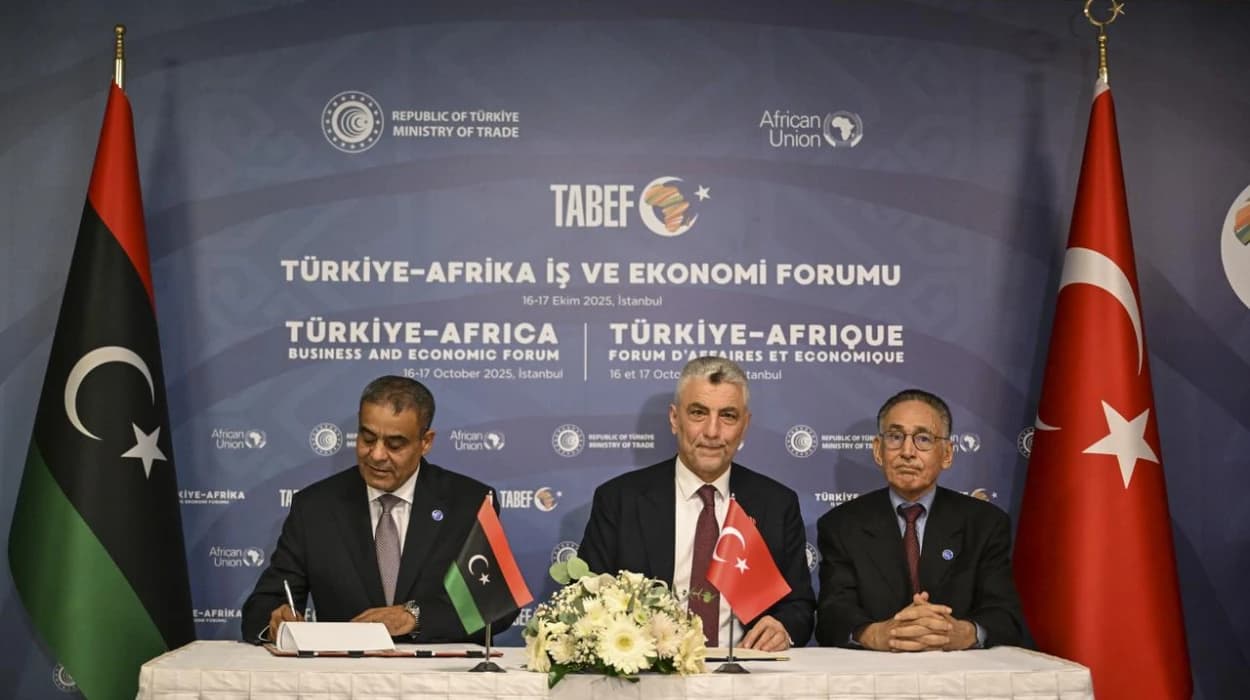Türkiye and Libya have signed two crucial agreements to
address Turkish contractors' outstanding receivables and initiate new
cooperation projects, marking the start of strengthened bilateral economic
relations. The deals were signed during the 5th Türkiye-Africa Business and
Economic Forum, with plans for future investment and economic commission
meetings to guide ongoing collaboration.
Türkiye and Libya formalize key agreements
As reported by Daily Sabah, Türkiye and Libya have signed
two memoranda of understanding aimed at resolving the issue of Turkish
contractors’ unpaid receivables in Libya and fostering new projects between the
two countries. The agreements were inked by Turkish Trade Minister Ömer Bolat
and Libyan Trade Minister Muhammad al-Huwayj alongside Libyan Transport
Minister Muhammad Salem Al-Shahoubi on the sidelines of the 5th Türkiye-Africa
Business and Economic Forum held in Istanbul.
The Turkish Trade Ministry stated that the contracting
memorandum continues from inter-delegation talks held in Ankara in September
2025 and is significant for following up on Turkish contractors’ receivables in
Libya. Additionally, the memorandum marks the beginning of a new era where
Turkish contractors are expected to undertake new projects that will support
Libya’s reconstruction and economic development.
Commitment to increasing trade and cooperation
Both parties underscored their mutual commitment to
expanding trade volumes, which stood at $3.7 billion by 2024, and increasing
Turkish contracting businesses in Libya. The ministers identified sectors with
potential for cooperation, including hydrocarbons, renewable energy, mining,
customs, banking, and healthcare.
The agreements also include plans to organise the
Türkiye-Libya Investment and Business Forum and to hold the 22nd meeting of the
Türkiye-Libya Joint Economic Commission in Tripoli on December 16-17, 2025.
Institutional framework for future collaboration
According to the Turkish Trade Ministry, the two sides signed a
“Joint Declaration on the Establishment of the Joint Economic and Trade Commission (JETCO)”
and the
“Minutes of the Second Meeting of the Türkiye-Libya Joint Working Group.”
These documents are expected to provide a
roadmap for ongoing and future joint economic cooperation between the two
nations.
Background on contracting challenges and economic ties
As detailed by Yeni Şafak, the contracting memorandum is a
pivotal mechanism for addressing long-standing issues surrounding Turkish
contractors’ unpaid receivables in Libya. This follows the disruptions caused
by Libya’s internal conflict and political instability, which led to Turkish
firms having to pause or abandon projects amid challenging security conditions.
Despite these difficulties, Turkish contractors have sustained payments
including insurance commissions and letters of credit from Libyan banks.
The memorandum signals a transition into a new phase of
cooperation, enabling Turkish companies to resume and start new projects
contributing to Libya’s infrastructure and economic recovery. Both nations also
committed to broadening their trade relations beyond traditional sectors.
Economic collaboration beyond contracting
The agreements highlight the potential for cooperation in
diverse sectors such as hydrocarbons, renewable energy, mining, customs,
banking, and healthcare, reflecting ambitions for a comprehensive economic
partnership. Türkiye and Libya aim to significantly enhance their economic
ties, continuing a trend where bilateral trade has consistently hovered around
several billion dollars annually.
Upcoming joint forums and commission meetings
Officials confirmed plans to organise the inaugural
Türkiye-Libya Investment and Business Forum and the 22nd Türkiye-Libya Joint
Economic Commission meeting in Tripoli later this year. These gatherings are
designed to strengthen institutional cooperation, review progress, and
establish future priorities for joint ventures and economic development
projects.
Perspectives on reconstruction and investment
Libyan officials emphasized the importance of Turkish
partners in Libya’s reconstruction efforts, especially in infrastructure and
energy sectors. Turkish firms are seen as vital contributors to Libya’s
development goals, with the agreements facilitating smoother cooperation and
easing financial disputes that previously hindered project completions.
Türkiye and Libya’s latest agreements present a renewed commitment to economic collaboration, addressing contractor receivables and laying the groundwork for extensive joint development projects. The deals, signed by high-level trade and transport ministers, embody a new chapter in bilateral relations, combining trade expansion with structured institutional frameworks for ongoing cooperation. These efforts align with both countries’ goals of economic recovery and development, with upcoming events in December to further solidify their partnership.
